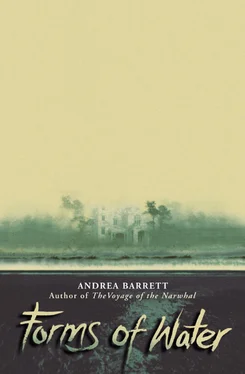“It’s nice of you to rescue us,” Brendan said.
“Thank me if I fix it.” Jackson parked Brendan on the grass near the lawn chairs and towed the van into the garage. Henry followed him, and Brendan watched the clouds of birds gather and swoop and settle down for the night. The light inside the garage glowed yellow against the darkening sky. He could hear the men talking softly, the clang and rattle of tools, the hiss and pop as a car of beer or soda was opened. He lowered his head to his chest and fell asleep thinking about his days in China, where he had been when his brother had died.
On a bitter winter’s day in 1937, Father Vincent, his abbot in Massachusetts, had gathered the community together to break the news. They’d have a year, Father Vincent explained, no more, before the valley was flooded. They had to disperse; they had to decide, each of them, where they wanted to go. France, Kentucky, California; there were houses all over the world. Snow covered the fields and icicles hung from the roof of the church. Brendan’s companions disappeared one by one as the snow began to melt. The witch hazel down by the pond exploded into silky gold tassels; the crocuses Brendan had planted flowered and the grape hyacinths pushed up their heads. Still he hadn’t made a decision. “Brendan,” Father Vincent said gently. “You have to choose.” When the buds on the dogwoods began to swell, Brendan asked to be sent to China.
The Chinese foundations were shorthanded, he told his abbot. And he was homeless and in his prime. Where else could he be of more use? He looked out at the beautiful hand-laid walls and imagined them knocked to the ground.
“China?” Father Vincent had said.
“China,” he’d replied. He’d said nothing about the sense of betrayal he’d felt when his prayers had failed to fend off the water, nor about his need to put half a world between his failure and himself. He had eschewed linear prayer in favor of a deep and loving contemplation of his surroundings, just as Father Vincent had taught him. Now his surroundings were about to disappear.
When the cherries and apples flowered, and the rhododendrons and his special azaleas, he packed his small bag and left the abbey. He crossed the United States by train, the Pacific by boat, the rugged hills of Inner Mongolia by foot and mule. The Japanese warships in the harbor startled him, as did the Japanese soldiers waiting on the wharf at Tientsin. The rough buildings of his new abbey, Our Lady of Consolation, startled him too and then pleased him. They were run-down, primitive; he could work on them forever and never fear that someone else might want them. No orchards, no flowers. His brothers were Belgian, Dutch, and French; the novices and postulants were all Chinese. He communicated with them in ragged Latin until he learned to speak Mandarin.
In the garden behind the refectory he helped raise millet and sorghum, potatoes and cabbage; he grew thin on the coarse food and dreamed of eggs, which were rare. The dormitory, unheated even in winter, was so cold that he slept in two sets of padded jackets and pants beneath his robe. In the hot weather, the mud-brick walls swarmed with lice and ticks. He was homesick, uncomfortable, sometimes frightened, but he told himself that these were the trials he was meant to endure, the tests he was meant to pass. In his heart, buried so deep he never saw it, was the dream that if he surmounted all this, he might return to the Paradise Valley and find his home miraculously restored.
He’d expected hardships, but he hadn’t expected to find himself in the middle of a war. In Europe, war was a rumor and then it was real. In China, the war that seemed to have gone on forever just went on and on. Sometimes he could hardly keep track of who was fighting whom. The abbey lay between a Japanese garrison and a ridge held by Chinese Communist troops, and there were weeks when columns of one or both advanced and retreated across the valley, so close he could smell the guns. Japanese officers rested in the abbey’s guesthouse after the battles; Communist soldiers demanded money and food and threatened to conscript the young brothers. Wounded soldiers from both sides took refuge in the chapel. He spoke all the time — he had to speak, to tend to the wounded, buy time, buy peace, buy food — and as his silence vanished, so did his ability to pray. Prayer was action, he’d once believed; a group of men gathered together might pray the world right. He prayed for the war to end, and bombs rained down on Pearl Harbor.
In the Japanese internment camp near the coast, where he and the European monks were taken, he shed the last remnants of his cloistered, contemplative life. The Rules of the Camp for Enemy Nationals supplanted the Rule of his Order; he lived in rooms packed with Protestant missionaries and their families, nuns and monks from other Orders, teachers, customs officers, Russian women, Dutch Lazarists, American businessmen. There was little to eat and no privacy. He kept himself busy nursing the sick and arranging lectures and teaching the children to read, and he tried to convince himself that he honored his vows by serving others. Laborare est orare, he reminded himself. To labor is to pray. At night he stood near an isolated section of fence and tossed the money and jewelry he’d gathered from the inmates up and over and into the hands of Chinese farmers, who tossed back forbidden food. Two dozen plums once arced back to him, one precious piece at a time.
He tried to build a life out of what he had at hand. This is our way, Father Vincent had once told him and the other postulants. In this community, with this work, these people, these problems — our vow of stability means that we embrace life as we find it. We accept God’s plan. The abbey where Brendan had made that vow was gone, and he’d been torn from his adopted one, but he tried to see the camp as a new home. Rumors flew through the camp like moths: England was defeated, Russia crushed, Australia conquered by the Japanese. The rumors were so frequent and so often false that he ignored the ones following the first B-29s over the camp. The Japanese were abandoning China, he heard. They were taking the internees back to Japan with them. A Dutchman told him gloomily that they would all be murdered first.
Brendan was standing with a group of Belgian nuns when they heard about the bombs that had fallen on Hiroshima and Nagasaki. “There is no city,” whispered the nun who’d heard the news from a guard. “The city is gone.” A few days after that, six American soldiers parachuted into the dry field outside the fence, and then they were free. Just like that, the community Brendan had worked so hard to hold together dissolved. The internees scattered; Brendan and his brothers made their way back to Our Lady of Consolation just in time to see the abbot imprisoned and the community attacked.
One war was over, but the civil war had just begun and the abbey lay in an area held by Communist troops. Brendan watched the soldiers turn the peasants against the monks. The monks were oppressors, the soldiers said. They had stolen the peasants’ land. Brendan stood in front of an angry crowd and said, “Have we not shared every crop with you? Have we not fed you during famines?” But the peasants, encouraged by the soldiers, took the abbey’s goats and grain and straw mattresses, the sacristy vessels and the firewood. They tore the leather covers off the books. They imprisoned the monks in the chapter room and held trials and meetings, beatings and interrogations. The abbey was gutted; the trials grew more serious. The abbot’s head was crushed with rocks before Brendan’s eyes. On a December day, after Brendan heard a rumor that Nationalist troops were on their way to rescue them, he and his brothers were marched away from the abbey and into the surrounding hills.
Читать дальше












